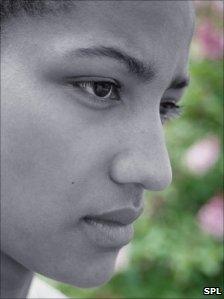Race bias in cancer 'costing lives'
- Published

Black women have traditionally been neglected
Each day around 125 women are diagnosed with breast cancer, but are they all getting the same chances?
In this week's Scrubbing Up, biochemist Abi Ajose-Adeogun from Better Days Cancer Care - a cancer charity for African Caribbean women - and its founder, Marina Raime, argue that black women are getting a raw deal.
They say black women with breast cancer suffer from higher death rates and that research carried out mainly on white women can produce skewed data.
Breast cancer is the most common cancer affecting women in the UK with approximately 40,000 new cases diagnosed each year.
For many years the "face of breast cancer" has been that of white middle class women, who have been used to illustrate posters and be in adverts.
The lack of any other ethnic image has led to the perception, by many, that other ethnic groups particularly black women are not at significant risk of developing breast cancer.
And this emphasis on white women may have cost lives.
Research has continued to focus primarily on white women, leaving unearthed for many years the effects of breast cancer on different ethnic groups.
Only in the last few years have studies demonstrated that there are significant differences in the biology and epidemiology of breast cancer in black women.
But the lack of focus on this area has meant that the outcome for black women diagnosed with breast cancer in the UK is worse than their white counterparts leading to an inequality in survival rates.
In the UK, only a handful of studies have been conducted looking at black women and breast cancer.
These studies have confirmed the results of the vast number of studies conducted in the US on African-American women.
They demonstrated that black women develop breast cancer on average 10-20 years younger than white women.
In addition to this, a significant number of black women develop a more aggressive form of breast cancer. The upside for black women is that they are less at risk of developing breast cancer but for those that do develop breast cancer the outlook is worse than their white counterparts.
These differences - the younger age of onset and the more aggressive nature of the cancer - can reduce the chances of survival. And to make matters worse many of the younger women tend to be misdiagnosed and/or diagnosed late.
In addition, as a result of research being based on white women the breast cancer screening age was set at 50, which, based on the younger age of onset of disease, is too high for black women.
Also the misconception by black women themselves that they are not at risk of developing breast cancer also leads to delayed diagnosis.
Added to this the cancer is often more aggressive in black women - a type of breast cancer called triple negative breast, which is little understood or researched - further hampering survival chances.
Now Cancer Research UK and Breakthrough Breast Cancer are studying it.
But unless we want more unnecessary deaths we must correct the balance by lowering the screening age for black women; ensuring more research is conducted; introducing health education programmes to raise awareness of the signs, symptoms and risk factors of breast cancer; and supporting programmes to eliminate the barriers that black women face when accessing breast health services.
Your comments
All care is based on the bog standard 'white' male - women of different races are ignored and women are ignored generally in non-sex specific cases. It is as if people cannot see differences make a difference. I am mixed race and don't know how it will affect me - and I have lost so many Asian and Black friends with breast and other female cancers - it cannot be accidental. The researchers themselves need to change - they need to become not exclusively white males but represent actual ability, people should not be hired because they come from the same white male background as they are now - men are hired "on the nod" and such men simply cannot "see" women or black or Asian people. Katy Charles, London
This is a particular instance of something more general; we know of a great many factors which predispose to breast cancer, but this information (apart from family history) is not being used to identify and help the women most at risk. In Germany, women in their 40s get a check-up every year with a specialist doctor. Helen, Bristol
This is a very important article, and on a very important subject. Doctors have known for years that there are important differences between races, and this is the latest to add to the list (diabetes liklihood, alcohol tolerance etc), but the problem is how to square the circle of known risks against the politically correct brigade who deny such differences, and claim that race is only a social construct? Breast cancer screening is in fact based on a radiation benefit ratio, not cost, but suppose that anaysis were to show that the screening should be different for black women, either earlier because of age as above, or avoided completely because of the lower rate of disease and higher radiation sensitivity in youger women making it more likely to kill than cure. We can all imagine the headlines - "special treatment for black women" or "black women denied the same rights as white" - all of which would miss the true underlying medical differences. And that's all before we start to consider sub-groups, mixed-race, and all the other issues around racial categorisation. Dr Dave Harvey, Swansea
The same applies to prostate cancer, by the way. And, now I've searched, lung cancer. And with a little further searching, it seems that many types of cancers have mortality rates that favour caucasians (skin cancers seem to be exceptions). Eddie Dubourg, Lothians